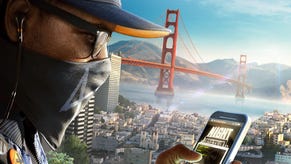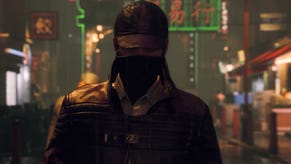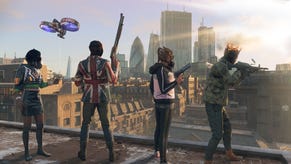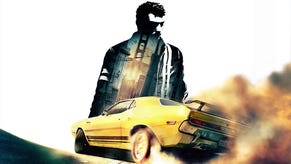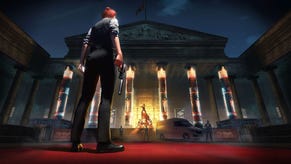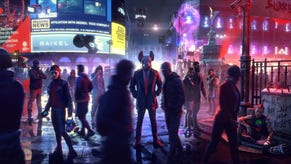Watch Dogs: you're Big Brother, who will you watch?
Watch Dogs casts players as digital overseer across a fully-connected world. Catherine Cai speaks with senior producer Dominic Guay at E3 to find out who exactly you'll be watching.
Not too long ago, George Orwell wrote a little book called 1984 that painted a dystopian world of omnipresent government surveillance.
Cameras are mounted on the walls of every room, and nothing is kept from Big Brother's prying, ever-watching eye.
Of course, Orwell wrote 1984 in 1948, where the idea of such extensive surveillance, however terrifying, was still something of the distant future.
It's something that's a little closer to home now, as information rapidly moves into the digital space, making it much more readily accessible… and much more vulnerable to government observation.
With Watch Dogs, Ubisoft Montreal delves a little bit deeper into the same themes that were explored in 1984. However, you aren't a rebel setting out to oppose Big Brother, trumpeting the morality behind free speech and democracy.
That would be far too clichéd of a story to tell. No, in the interests of being post-modern and contrarian, you are Big Brother.
Aiden Pearce is Watching.
In Watch Dogs, you play as Aiden Pearce, a vigilante hacker of rather questionable morality. "He's neither a very good guy nor a very bad guy," said Senior Producer Dominic Guay. "He's somewhere in the middle there. He's got his flaws."
The decision to make Pearce, for lack of a better term, so bland seems to be intentional on the developer's part. Though he isn't suffering from silent protagonist syndrome, he still serves as a vehicle that players can experience the world of the alternate reality Chicago through.
"You don't want to make him so defined that you're not him as the player. It is true that the player projects himself into him, but he does have a personality, a background, and his vision on things," said Guay. "But, the player is really going to be the one in charge in making decisions and in how he wants to do the things in the game."
Aiden Pearce is the every-man because he's the stand-in for the player. Essentially, Ubisoft is trying to set up a scenario in which the player has the abilities to play with surveillance and security. "We've been researching a lot on privacy and surveillance and hacking and all those things for the past four years," explained Guay.
"It's really hard to judge on those things because technology can either be good or bad depending on how you use it. For us, obviously, there's benefits to surveillance. I want security cameras in public places that will permit us to catch bad people and criminals, but at the same time when you're working on Watch Dogs you're also saying, 'Yeah, but if I'm giving myself the power to abuse those things.'
"It's a tricky subject and a hard balance to find. We're not trying to push an answer to that balance in the game. What we're really doing is saying, "Okay. Here's the city. Here's the system. We give you the control to hack into them. How will you use those things?"
Crafting the People and the Open World Experience of an Alternate Chicago
When developing an open world game, verisimilitude is valued. Too often in this genre, realism is shirked for map size. However 'populated' these game worlds are, they're shallow and lonely experiences when it's painfully obvious that the AI is … well … just that.
That's something you especially don't want in a game that's supposed to be about invading people's privacy. In order for you to fully understand the moral implications of the actions you're taking, you have to feel the perversion in intruding into people's lives, from their day-to-day conversations to their darkest secrets.
Of course, for the developers, their task is twofold. They must deliver both a city and its inhabitants and make both feel genuine.
Watch Dogs is set in an alternate reality Chicago; of course, Ubisoft has done its best to recreate the experience. "It's not the real Chicago in the sense that we played with it, so that it's more fun, even though it's really inspired by it. We have not only the city, you can actually go beyond the city limits," said Guay.
"But what was more important to us than making [the city] massive was making it dense. That's the hardest thing with a modern city. If you're on a street corner, there's a lot of things going on around you. So that was more a goal."
Ubisoft's also set down plenty of content to make the characters in the game as varied as possible. However, they make no promises that every citizen of Chicago is going to be unique. "If someone is having a conversation on the phone … I mean we had to record someone somewhere," explained Guay.
"Someone had to write this line. We had to produce an insane amount of content… and we do. The amount of conversation you can hack into is just mind-boggling. What we're doing is basically assembling those characters from databases.
"We said, 'Okay, we're in a poor neighborhood so it should be someone with low income, and this kind of job.' We're kind of assembling those characters. The idea is to have enough so that if you're interested in tapping into people's private lives and doing that sort of thing, you won't have a repeating loop. You will always be finding new stuff. At the same time, we're not saying that everybody's unique in the city. There's a limit to this."
Action and Reaction: Leaving Your Marks on the People of Chicago
One of the most touted features of Watch Dogs is its dynamism. Based on your actions in the game, Chicago will slowly evolve to reflect your actions. Think of it almost as a feedback loop. Should you decide to play the role of the benevolent vigilante, people on the streets will sing you praises.
Should you decide to do the opposite and massacre thousands, people will decry your name to the gods. But whatever the case, your actions as Aiden in the world will impact world development, but not how the narrative of the game unfolds.
"The game gives you a lot of freedom. We kind of rate your reputation. The people get an opinion of you in the city and it's looped back to you," said Guay. "We're letting players play the way they want to play."
Let's call it Dishonored syndrome, where player play style affects the outcome of the game, effectively marking specific player behaviors as positive and negative. Watch Dogs is looking to be a little less patronizing about morality: "What we realized was more important is to give you a feedback of how you impacted the city. What you've done in the past, all the things that you've done as you play the game, how will that have a lasting impact on the game? That will reflect back to you."
Watch Dogs isn't looking to make any sort of moral message. Instead, it's showing its players respect by granting upon them the freedom to make their own decisions. "We won't boil it down to 'the princess is saved' or 'the princess is dead.'" Guay concluded. "We're going to make it more about 'this is the Chicago that you've created.'"
What kind of Chicago will you make once Watch Dogs launches? The game drops on PC, PS3, Wii U and Xbox 360 across North America from November 19, and across Europe November 22.





